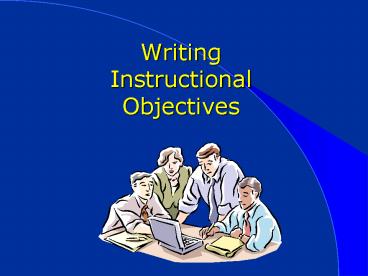Writing Instructional Objectives - PowerPoint PPT Presentation
1 / 18
Title:
Writing Instructional Objectives
Description:
Instructional Objectives What is an objective? A statement describing a proposed change of what the learner can do when (s)he has successfully completed a learning ... – PowerPoint PPT presentation
Number of Views:411
Avg rating:3.0/5.0
Title: Writing Instructional Objectives
1
Writing Instructional Objectives
2
What is an objective?
- A statement describing a proposed change of what
the learner can do when (s)he has successfully
completed a learning experience.
3
Get Smart
- Specific
- Measurable
- Attainable
- Rewarding
- Timed
4
The ABCD's of Objectives
- A Audience Who is this objective for?
- B Behavior What will be measured?
- C Conditions Under what conditions?
- D Degree To what degree?
5
(No Transcript)
6
Examples of Clear Wording
- Poor Better
- Examples to know to write
to understand to recite
to appreciate to compare
to believe to describe
to enjoy to construct
to grasp to solve
7
Example
- Students enrolled in ALEC 611 will be able to
write 3 objectives (affective, behavioral,
cognitive) with at least one in the higher domain
of learning using the guidelines from the lecture
and web readings.
8
3 Domains of Learning
- Cognitive, Affective, Psychomotor
9
Cognitive (lack of knowledge)
- Acquisition of information and concepts
- related to course content.
10
Cognitive Domain
- Instructional objectives should be written such
that all levels of knowledge are addressed. - Bloom's six cognitive levels are Knowledge,
Comprehension, Application, Analysis, Synthesis,
and Evaluation
11
Cognitive Domain Instructional Objectives
- Knowledge list, recite, selectComprehension ex
plain, describeApplication interview,
construct, solveAnalysis compare/contrast,
analyzeSynthesis debate, describeEvaluation e
valuate, discriminate - Objectives are more easily written for lower
order cognitive skills
12
Affective(lack of desire)
- Fostering attitudes, feelings, and preferences
13
Affective Domain
- Receiving Learners willingness to attend
- Responding Learners active participation
- Valuing Worth or value to learner
- Organization Building a consistent value
system resolving conflicts. - Characterizationlife style
14
Affective Domain Instructional Objectives
- Receiving watch, listen, read, view
- Responding respond, reply, describe
- Valuing choose, decide, pick
- Organization hypothesize, outline, diagram
- Characterization act, do, behave, demonstrate
15
Psychomotor(lack of skill)
- Competence in the performance of procedures,
operations, methods, and techniques.
16
Psychomotor Domain
- Perception sense organs guide motor
activity - Set readiness to take action
- Guided Response imitation trial error
- Mechanism habitual movement
- Complex Overt
- Response skillful performance of motor
acts - Adaption modification of movement
- Origination creation of new movement
17
Psychomotor Domain Instructional Objectives
- Perception touch, feel, draw
- Set desire, willingness, eagerness
- Guided Response watch and do with help
- Mechanism do alone less time, without
describing the steps - Complex Overt
- Response do without error
- Adaption do in a different way
- Origination do in a new way
18
(No Transcript)































